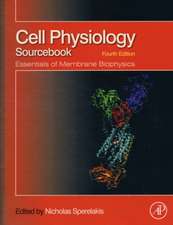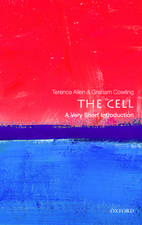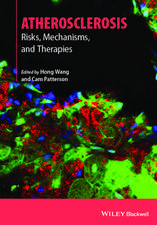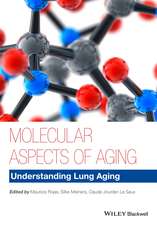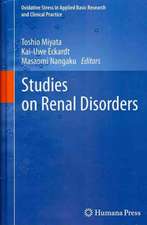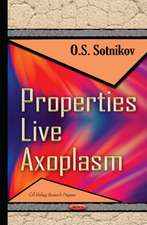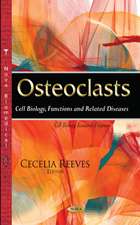Studies on Hepatic Disorders: Oxidative Stress in Applied Basic Research and Clinical Practice
Editat de Emanuele Albano, Maurizio Parolaen Limba Engleză Hardback – 10 iun 2015
Din seria Oxidative Stress in Applied Basic Research and Clinical Practice
- 5%
 Preț: 1483.21 lei
Preț: 1483.21 lei - 18%
 Preț: 1272.98 lei
Preț: 1272.98 lei - 18%
 Preț: 1007.65 lei
Preț: 1007.65 lei - 18%
 Preț: 1843.73 lei
Preț: 1843.73 lei - 18%
 Preț: 1667.12 lei
Preț: 1667.12 lei - 18%
 Preț: 1242.52 lei
Preț: 1242.52 lei - 15%
 Preț: 695.70 lei
Preț: 695.70 lei - 15%
 Preț: 700.94 lei
Preț: 700.94 lei - 18%
 Preț: 1235.43 lei
Preț: 1235.43 lei - 18%
 Preț: 1560.73 lei
Preț: 1560.73 lei - 18%
 Preț: 1225.94 lei
Preț: 1225.94 lei - 18%
 Preț: 951.29 lei
Preț: 951.29 lei - 18%
 Preț: 959.98 lei
Preț: 959.98 lei - 18%
 Preț: 953.65 lei
Preț: 953.65 lei - 18%
 Preț: 965.97 lei
Preț: 965.97 lei - 18%
 Preț: 966.27 lei
Preț: 966.27 lei - 18%
 Preț: 958.07 lei
Preț: 958.07 lei - 15%
 Preț: 654.95 lei
Preț: 654.95 lei - 18%
 Preț: 954.45 lei
Preț: 954.45 lei - 18%
 Preț: 961.41 lei
Preț: 961.41 lei - 24%
 Preț: 826.77 lei
Preț: 826.77 lei - 20%
 Preț: 562.85 lei
Preț: 562.85 lei - 18%
 Preț: 1243.46 lei
Preț: 1243.46 lei - 18%
 Preț: 1010.96 lei
Preț: 1010.96 lei
Preț: 962.18 lei
Preț vechi: 1173.39 lei
-18% Nou
Puncte Express: 1443
Preț estimativ în valută:
184.15€ • 191.74$ • 155.62£
184.15€ • 191.74$ • 155.62£
Carte tipărită la comandă
Livrare economică 11-25 martie
Preluare comenzi: 021 569.72.76
Specificații
ISBN-13: 9783319155388
ISBN-10: 3319155385
Pagini: 532
Ilustrații: XXII, 516 p. 49 illus., 31 illus. in color.
Dimensiuni: 155 x 235 x 27 mm
Greutate: 0.93 kg
Ediția:2015
Editura: Springer International Publishing
Colecția Humana
Seria Oxidative Stress in Applied Basic Research and Clinical Practice
Locul publicării:Cham, Switzerland
ISBN-10: 3319155385
Pagini: 532
Ilustrații: XXII, 516 p. 49 illus., 31 illus. in color.
Dimensiuni: 155 x 235 x 27 mm
Greutate: 0.93 kg
Ediția:2015
Editura: Springer International Publishing
Colecția Humana
Seria Oxidative Stress in Applied Basic Research and Clinical Practice
Locul publicării:Cham, Switzerland
Public țintă
ResearchCuprins
Part 1: Oxidative Stress: Basic Principles in the Liver Scenario.- Principles of Redox Signaling.- Oxidative Stress, Antioxidant Defenses and the Liver.- Oxidative Mechanisms in Liver Senescence and Regeneration.- Part 2: Oxidative Stress and Liver Pathophysiology: From Cell Damage and Death to Inflammatory and Fibrogenic Responses.- Oxidative Stress and Hepatocellular Injury.- Oxidative Stress and the Unfolded Protein Response in the Liver.- Oxidative Stress and Liver Inflammation.- Oxidative Stress and Liver Ischemia-Reperfusion Injury.- Oxidative Stress and Liver Fibrogenesis.- Part 3: Oxidative Stress in Specific Liver Disease Conditions.- Oxidative Stress in Acute Liver Failure.- Oxidative Stress in Alcoholic Liver Disease.- Oxidative Stress in Chronic Viral Hepatitis.- Oxidative Stress in Nonalcoholic Fatty Liver Disease.- Oxidative Stress in Non-autoimmune Biliary Diseases.- Oxidative Stress in Autoimmune Liver Diseases.- Oxidative Stress and Hepatic Iron Overload.- Oxidative Stress in the Central Nervous System Complications of Chronic Liver Failure.- Oxidative Stress and Liver Transplantation.- Antioxidant Approach to the Therapy of Chronic Liver Disease.- Part 4: Oxidative Stress and Liver Cancer.- Liver Cancer Classification.- Oxidative Stress Mechanisms in Hepatocarcinogenesis.- The Role of Oxidative Stress in Hepatocarcinogenesis.
Notă biografică
Emanuele Albano, MD, PhD received degrees in Medicine, Surgery and General Pathology from the University of Turin. He completed a PhD in Biochemistry from Brunel University of West London, Uxbridge, UK. He conducted research there as well as at the Departments of Biochemistry and Toxicology at the Karolinska Institute in Stockholm. He is currently Professor of General Pathology at the University of Eastern Piedmont "A. Avogadro" in Novara where he was formerly Director of the Department of Medical Sciences. Dr. Albano is a member of several European and international scientific societies, including the Society for Free Radical Research and the International Society for Biochemical Research on Alcoholism and serves on the editorial board and referees at several journals. His main fields of interest are the study of the molecular mechanisms of cell damage resulting from oxidation caused by free radicals with particular reference to changes in energy balance and ionic homeostasis of the liver including the involvement of free radicals in the pathogenesis of liver injury induced alcohol abuse.
Maurizio Parola, MD, PhD, is Doctor of Biological Sciences, with a PhD in Experimental and Molecular Pathology, from the University of Turin and a PhD in Biochemistry from Brunel University in London. He is currently a Professor of Pathology on the Faculty of Medicine and Surgery at the University of Turin where he was formerly Director of the Department of Experimental Medicine and Oncology. Dr. Parola is a reviewer and referee for several scientific journals and a member of several international societies including The New York Academy of Sciences. His research has been devoted to studies concerning the pathogenesis of experimental acute and chronic liver injury, with particular regard to the pathogenesis of liver fibrosis and other pathological conditions such as Alzheimer's disease and diabetes mellitus. In particular, a significant part of the experimentalstudies was devoted to the analysis of the possible pathogenic role of oxidative stress as well as the pathogenic role played by different cell populations liver in the evolution of chronic liver diseases.
Maurizio Parola, MD, PhD, is Doctor of Biological Sciences, with a PhD in Experimental and Molecular Pathology, from the University of Turin and a PhD in Biochemistry from Brunel University in London. He is currently a Professor of Pathology on the Faculty of Medicine and Surgery at the University of Turin where he was formerly Director of the Department of Experimental Medicine and Oncology. Dr. Parola is a reviewer and referee for several scientific journals and a member of several international societies including The New York Academy of Sciences. His research has been devoted to studies concerning the pathogenesis of experimental acute and chronic liver injury, with particular regard to the pathogenesis of liver fibrosis and other pathological conditions such as Alzheimer's disease and diabetes mellitus. In particular, a significant part of the experimentalstudies was devoted to the analysis of the possible pathogenic role of oxidative stress as well as the pathogenic role played by different cell populations liver in the evolution of chronic liver diseases.
Textul de pe ultima copertă
This volume examines the impact of free radical biology on hepatic disorders such as viral hepatitis, alcoholic disease, iron overload, and Wilson’s disease. It thoroughly explores the role of oxidative stress in acute and chronic disease, addressing factors such as redox biomarkers; antioxidant defense and protection; cell signaling; mutations; oxidative damage involving lipids, proteins, and nucleic acids; membrane trafficking; inflammation; mitochondrial dysfunction; alterations in immunological function; toxicology; and hypoxia. Its four sections, consisting of chapters by recognized field leaders, deal with basic principles of oxidation and hepatology, oxidative stress-related pathophysiology, oxidative stress and liver disease, and liver cancer.
Intuitively structured and comprehensive, Studies on Hepatic Disorders is an invaluable addition to the Oxidative Stress in Applied Basic Research and Clinical Practice series and an essential resource for clinical hepatologists and researchers interested in the role of oxidative stress on liver function and disease.
Intuitively structured and comprehensive, Studies on Hepatic Disorders is an invaluable addition to the Oxidative Stress in Applied Basic Research and Clinical Practice series and an essential resource for clinical hepatologists and researchers interested in the role of oxidative stress on liver function and disease.
Caracteristici
Provides a comprehensive look at all aspects of oxidative stress in the liver from basic science principles to cell damage and response Beyond the critical basic science and pathophysiology of liver disorders, most of the chapters focus on specific diseases and cancer, making this unique and essential reading for both research and clinical hepatologists Examines the current state of free radicals’ impact on hepatic disorders

